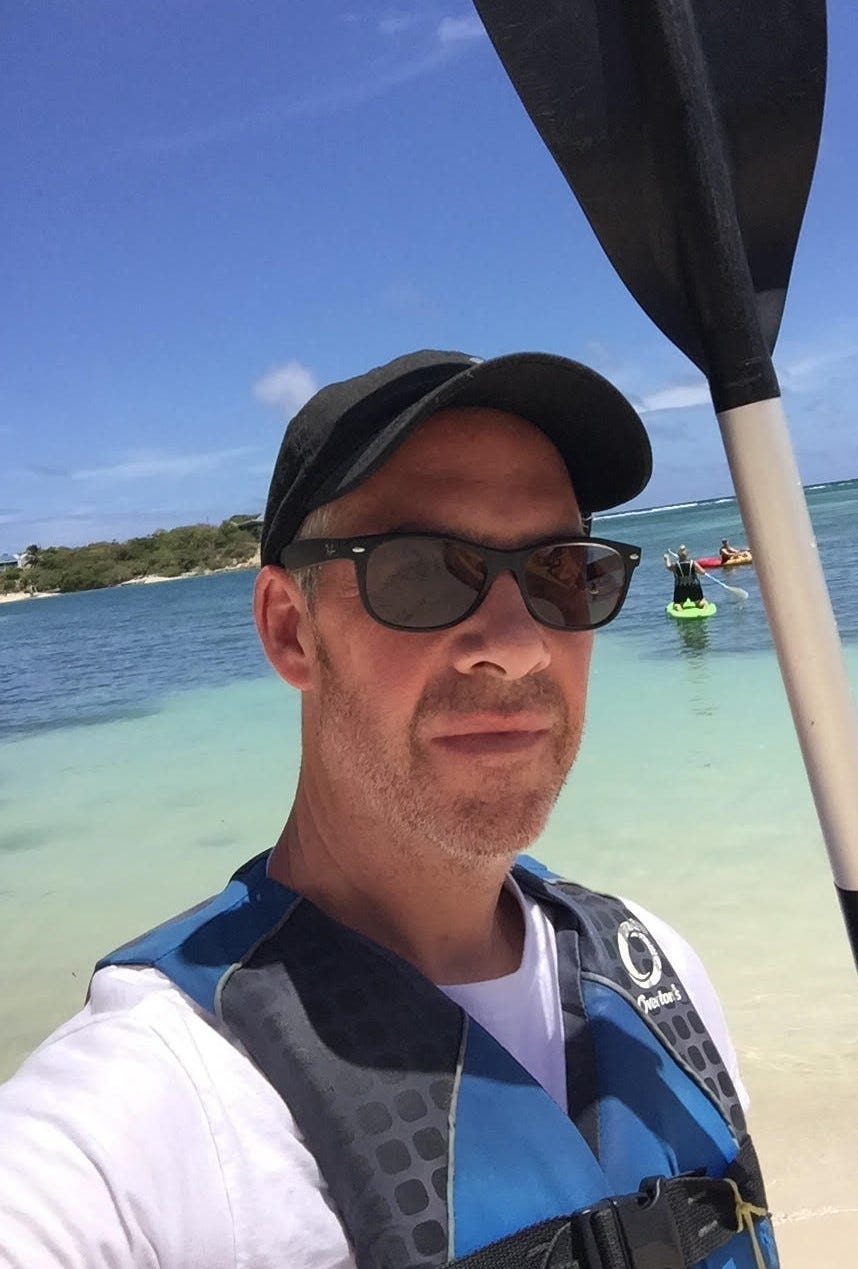The Reach Out: Dan Pasternack
The comedy writer, producer, and audio documentary creator talks how the weather, OCD, fatherhood, and music all factor into his exercise habits.
Dan Pasternack has been writing, producing, and developing comedic content for decades.
He began his pursuits in the 1980s, making records of funny songs which were played on The Dr. Demento Show before he began writing material for dozens of comedians and performing stand-up across the country.
After attending film school at USC, Pasternack worked at Paramount Pictures and CBS, prior to his first TV development job at the Fred Silverman Company. That led to positions at Granada, Studios USA and Carsey-Werner.
While VP of content for the Turner Broadcasting digital comedy platform Super Deluxe, Pasternack worked with talents like Bob Odenkirk, Nick Kroll, Norm Macdonald, and Maria Bamford.
As VP of development and production for IFC, Pasternack oversaw the development of Portlandia, Comedy Bang! Bang!, Whisker Wars, Out There, and The Spoils of Babylon.
He also served as co-producer on Beggars and Choosers (Showtime), executive producer on Starved (FX), and a writer and executive producer on Gravity (Starz).
Since helping to initiate The Interviews for the Television Academy Foundation in 1996, Pasternack has interviewed dozens of legends, including Milton Berle, Sid Caesar, Jonathan Winters, Bob Newhart, Whoopi Goldberg, and Billy Crystal.
Most recently, Pasternack founded Little Bear Bear Productions, through which he has produced programming for Adult Swim, and various audio documentaries, including the recently released Obsessive Comedy Disorder: The Continuing History of the Comedy Grammy Award, which features his interviews with Jim Gaffigan, Sarah Silverman, Tiffany Haddish, D.L. Hughley, Lewis Black, and “Weird Al” Yankovic.
I spoke with Dan Pasternack about why exercising regularly isn’t always as straightforward as it seems.
How do you make regular exercise a part of your life?
Mostly in my imagination.
For me, part of the gift of being born and raised in Southern California was running on the beach. I’ve been a runner on and off throughout my life, and I know how good it is for my physical and mental well-being.
But since moving to the east coast, I’ve learned that I suffer from a moderate case of seasonal affective disorder, which means that I only run when it's seasonal. I don't like extreme cold or extreme heat — I like exercising when it's nice out — so I will go through periods of depression when I’m not able to get out and exercise. But for about six weeks in the spring and six weeks in the fall, I love where I live! The rest of the year, I’m a mess.
Do you prefer to exercise in the morning?
I am not by nature a morning person. I was a comic in my teens and early twenties, so by definition, I was pretty nocturnal. When I have a regular sleep pattern, which is not often, the healthiest schedule for me, physically and emotionally, is to get up early and exercise — get it out of the way, and then get my day started.
Did the pandemic change anything about your exercise habits?
COVID impacted both my physical activity levels and my mental health. Everybody that I talk to says that the last two years are mostly a blurry shame spiral of binge eating and self harm.
Do you think exercise helps with your creativity?
For me, the whole point of running is to clear your mind, so exercise does help with creative work. It's when new ideas, clarity, and perspective become more accessible.
Do you wear a fitness monitor to track your steps, movement, and calories?
I wore a fitness bracelet for a while and used the health app on my phone, but because I suffer from obsessive compulsive disorder, I had to stop. Similar to the addiction I once had to video games — Wii bowling, in particular — where I would stay up for hours trying to bowl the perfect game, I became obsessive about checking my fitness monitor. It wasn’t quite an eating disorder level of unhealthy, but it was certainly on the OCD spectrum. I had to figure out how to make my exercise and diet regimen sustainable without being overly obsessive about it.
What is your main motivation for exercising now?
I would say self-hatred.
You’re not the first person from the comedy world to say this!
If you’re getting some consistency with this answer, I think this may say something about people in comedy.
After my mom passed away ten years ago, I hit my heaviest weight ever. I was really unhealthy, both emotionally and physically, and I had terrible knee pain.
I was in my 40s and had a little kid. Like any dad, I wanted to be able to run around and play with her. When I started exercising and changing the way I was eating, it became less about hitting a number on the scale. I was more focused on getting myself into better health by staying active and eating better in the long term.
Something funny happens when you experience a dramatic weight loss: People look at you as this kind of spiritual guru, like you're about to give them the secret that will change their lives — “How did you do it?” When you tell them it was “just diet and exercise,” the reactions you get range from disappointment to rage.
Do you listen to music, podcasts, or the news while running?
When I'm exercising, I like to be in a positive headspace. I can certainly see how watching the news might motivate rage-running, but if I’m so riled up afterwards, I’d probably be less inclined to do it again. I prefer to feel cleansed after working out.
So for me, it’s just music. There’s sort of a Zen spirituality that I feel when running, so I like a soundtrack that underscores and motivates that feeling.
I find podcasts to be more intellectually engaging, which, at least for me, isn’t the right mode for a workout.

Is there a kind of exercise that you think you might want to try?
There's a lot about yoga that appeals to me, but — and this probably says more about me — my general tendency towards impatience is likely what's keeping me from getting into it regularly.
What are you up to now?
I teach third year grad students at the Tisch School of New York University. Various classes in TV and digital development, which is really rewarding and something that I take a lot of pleasure from.
I’m working on numerous projects about the art of comedy, the history of comedy, and the history of television. All of these projects are labors of love and none of them — I repeat, none of them — are even remotely lucrative. But the work is very fulfilling.
The rest of the time, I try to be as present a family person as best I can, knowing that every minute I get to spend with my teenage daughter is like a gift that I'm all too aware is precious and fleeting.
I appreciate that Dan Pasternack’s approach to exercise and fitness is based on doing what works best for him. And as with the other comedy-world people I’ve interviewed, I may also have laughed a few (dozen) times.😄
Thank you, @DanPasternack
Please subscribe (it’s free!) to read about how familiar faces keep active and fit.😄
If you enjoyed this interview, please share it on social media.
Please follow me on Twitter @The_Reach_Out








